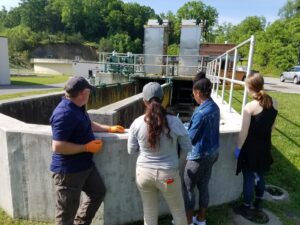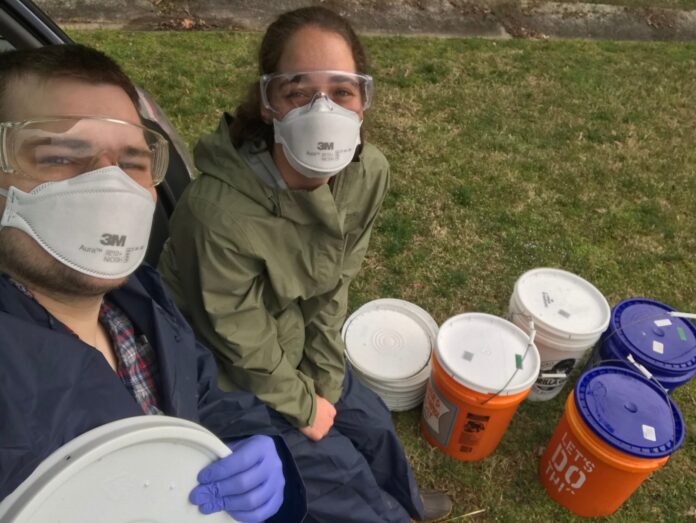Antibiotic resistance is a grand challenge of the 21st century. According to the U.S. Centers for Disease Control and Prevention, antibiotic resistance rates are increasing globally, with an estimated 35,000 related deaths per year in the United States in 2019, compared to 23,000 in 2013.
This threat calls for an interdisciplinary approach to combat its spread.
And Virginia Tech has just the team to do it.
With a $1.3 million grant from the National Science Foundation, computer science researcher Liqing Zhang and an interdisciplinary team of Ali R. Butt, Amy Pruden, and Peter Vikesland from Virginia Tech will build a cyberinfrastructure system, known as CI-WARS, for monitoring wastewater treatment plants for possible antibiotic resistance outbreak over time. CI-WARS stands for Cyberinfrastructure for Waterborne Antibiotic Resistance Risk Surveillance.
While an effort is underway to monitor the SARS-CoV-2 virus, the Virginia Tech sewage collection network of which Pruden and Vikesland are involved, the CI-WARS grant is allowing this team to establish sewage monitoring cyberinfrastructure for antibiotic resistance within certain communities that can address multiple public health issues.
This will give the researchers the access to sample sewage influent as it reaches the wastewater treatment plant and conduct shotgun metagenomic sequencing and anomaly detection to determine what kinds of antibiotic resistance genes may be circulating in a community.
Identifying anomalies in antibiotic resistance gene patterns in wastewater could help identify potential outbreaks before they occur, better inform clinical use of antibiotics, and improve treatment practices to prevent release of the genes and the bacteria that carry them to water bodies.
“This really excites me because we can really be proactive,” said Zhang, an associate professor in the Department of Computer Science in the College of Engineering and the project’s principal investigator. “The need for wastewater monitoring has been recognized internationally, but there is no unified cyberinfrastructure system in place to enable the monitoring.”
Each member of the four-person team brings a specialized expertise to look at the different angles of antibiotic resistance — the ability of some bacteria to survive antibiotic treatment, a capability encoded by antibiotic resistance genes.

Zhang and computer science colleague Ali Butt, professor and associate department head for faculty development, bring bioinformatics and cloud computing expertise to the table. They are joined by professors Amy Pruden and Peter Vikesland in the Charles E. Via Jr. Department of Civil and Environmental Engineering, who together provide integrated expertise in environmental microbiology, water chemistry, and water treatment.
The team will leverage their combined expertise to develop surveillance to pinpoint antibiotic resistance rates, determine if those rates are increasing in a given community, and verify that wastewater treatment is effectively removing resistant bacteria and their antibiotic resistance genes from the water.
“Combining next-generation DNA sequencing with cyberinfrastructure for monitoring patterns in antibiotic resistance gene detection at wastewater treatment plants is a promising and novel way to achieve this,” said Zhang.
The team came together after Pruden reached out to Zhang, recognizing tremendous promise for research at the intersection of computer science and environmental engineering. For their part, Pruden and Vikesland have built a network of international collaborators to establish sampling sites and protocols for monitoring antibiotic resistance genes in wastewater treatment plants and training a large and capable cohort of undergraduate and graduate students along the way. The pair previously received a $3.6 million grant National Science Foundation Partnership for International Research and Education, providing a foundation for this work.
Little did the team know last fall when they were preparing their proposal how timely it would prove in yielding direct benefits for community-level coronavirus monitoring. “Wastewater-based monitoring of the SARS-CoV-2 coronavirus has been rapidly initiated across the world, but there is no mechanism in place to synthesize the results,” said Vikesland. “CI-WARS will provide the digital infrastructure to make such syntheses possible.”
“This is a key moment in time to build capacity for monitoring wastewater treatment plants,” said Pruden. “With the current COVID-19 pandemic, I envision the cyberinfrastructure that our team will develop becoming a reality.”
Sampling wastewater treatment plants in Virginia is already underway. These efforts are led by Virginia Tech graduate students Connor Brown in the genetics, bioinformatics, and computational biology interdisciplinary Ph.D. program and Ayella Maile-Moskowitz in the civil and environmental engineering program. Through an established network of collaborators and a strong database, the local sewage results will be compared with data collected nationally and internationally.
The team also has plans to work with the Hampton Roads Sanitation District, the 2019 Gold Medal Award for Sustainable Water Initiative for Tomorrow Research Center.
Zhang admitted that it takes some audacity to entertain a collection schedule of this scope. “This temporal data generated is very valuable and unprecedented,” she said.
“The water industry has long realized the importance of monitoring and has implemented techniques to do so,” said Butt. “Our cyber infrastructure will thus help democratize access to crucial data and pave the way for finding solutions to challenges such as those posed by the current pandemic.”
– Jenise L. Jacques

